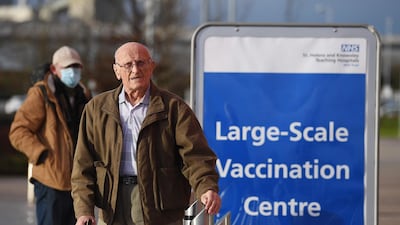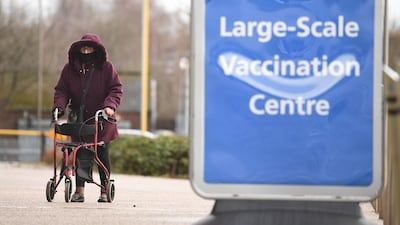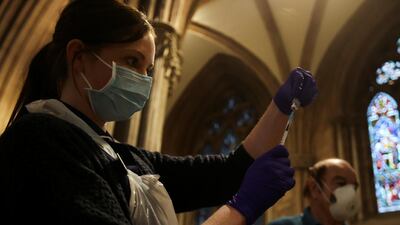The success of Britain’s fast-paced vaccination programme has led to one in 20 people being vaccinated, providing a significant boost for Boris Johnson’s beleaguered premiership.
The UK’s distribution of Covid-19 vaccines has far outstripped that in mainland Europe, with more than three million already receiving their first shot.
These latest figures show that five in 100 people in the UK have been vaccinated, which contrasts significantly with major European countries that have so far achieved just one in 100. Worldwide, Britain is fourth behind Israel, which has vaccinated 24 in 100, the UAE with 15 in 100 and Bahrain with six in 100.
The UK leader promised to have 14 million people vaccinated by mid-February which would cover the vast majority of the population most vulnerable to Covid. If he gets it right, it would be a major victory for Mr Johnson following several blunders during the pandemic.
Potentially in the knowledge that success in mass vaccination will lead to political redemption, the government is now said to be upping the daily jabs given from 200,000 to 500,000 a day and plans are advanced to set up a 24-hour vaccination centre.
On the insistence of Health Secretary Matt Hancock, the Vaccines Taskforce approached companies early, signing up for agreements that meant that, by August, Britain had access to more than 350 million vaccines from seven different potential vaccines.
Political commentator Paul Waugh said significant credit should go to Mr Hancock who “very early on spotted this vaccination programme was a bet worth putting lots of money on and it was him that pushed it really hard and said ‘right, we'll order these doses’ even though it might not work out well”.
Political insiders also believe that, if successful, it could “turn the page on his government,” allowing Mr Johnson to say “we've delivered” and, as a result, Britain will be able to open up its economy.
“The vaccination programme is so central to Boris’s government that he realises that if he gets it wrong, politically, it's an utter disaster because the public have cut him a lot of slack since the start of the pandemic,” Mr Waugh said.
Britain’s politicians can count themselves fortunate that they have been able to start vaccinating since early December because, just before Christmas, the new virus strain emerged in England that led to an infection rate averaging almost 50,000 a day. The British government on Friday reported a further 1,280 deaths and another 55,761 new Covid-19 cases.
With 3,235,000 people now vaccinated, the majority of them elderly and frontline medical staff, it means that hospitals will possibly not be entirely overwhelmed.
Italy has carried out the next highest number of vaccines with 972,000, followed by Germany with 842,000 and Spain with 676,000. Bureaucracy and scepticism over the side-effects of vaccination in France have led to a slow start, with just 318,000 vaccinated, or 0.49 per 100 people.
But within the UK there are still concerns that while Scotland and Northern Ireland have been able to rapidly vaccinate elderly people in care homes, England has lagged behind. Questions are still being raised about Britain’s innovation of allowing up to three months between shots although most scientists believe this does not present a problem.
A crucial reason why the UK has been able to surge ahead was that the Medicines and Healthcare products Regulatory Agency was able to approve the Pfizer and Oxford vaccines on December 2, weeks before the EU certified them.
Britain is also fortunate in having a large military with 5,000 personnel sent in to help vaccinate, test and deliver the supplies in what the Ministry of Defence has called the “biggest ever homeland military operation in peacetime”.
Whereas in France people have to see their doctor to give written consent five days before a jab, in Britain patients can simply book over the phone.
Mr Johnson has also made the commitment of ensuring that every person has a vaccination centre within 10 miles of their home. Additionally, the government has gone to the private sector, with vaccination sites opening in the Asda supermarket chain and the Boots pharmacist chain.
Despite a significant number of deaths, with 100,000 expected before the end of the month, the fast and widespread vaccination programme could dig Britain out of a significant hole. In large part that is down to its excellent scientific base rather than politicians.
“I'm a scientist and I think this reflects very well on the scientists who have been working nonstop on this as well as the NHS workers who are burned out and hundreds of them have died from Covid, which is unacceptable,” said Dr Ilan Kelman of University College London.
“For me, the political leadership has been a major concern throughout the pandemic and I fully understand that the way the UK government has managed the whole process may have consequences for public confidence. I hope for all of us the programme proves effective.”

















